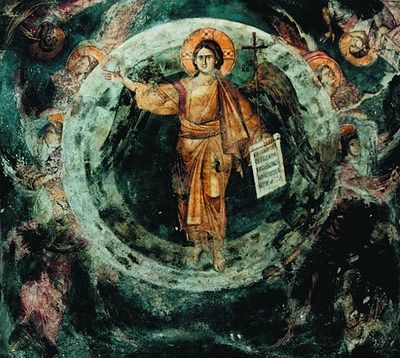If I speak in the tongues of men and of angels, but have not love, I am a noisy gong or a clanging cymbal. And if I have prophetic powers, and understand all mysteries and all knowledge, and if I have all faith, so as to remove mountains, but have not love, I am nothing. If I give away all I have, and if I deliver my body to be burned, but have not love, I gain nothing. (1 Corinthians 13:1-3)
Orthodox asceticism always presents us with a serious challenge to our tendency to oversimplify religion. On the one hand, it seems to argue for nothing except absolute obedience to rules as THE way to follow Christ. On the other hand, it reveals that strict obedience not only is a vacuity but is spiritually dangerous for it deceives us about its purpose. As we continue on the spiritual sojourn of the Nativity Fast, we can think about the purpose of fasting and self-denial.
The same amma also said “it is neither spiritual discipline nor vigil nor diverse toil that saves us if there be not genuine humble-mindedness. For there was a solitary driving off demons and he used to examine them:
‘What makes you come out? Is it fasting?’
They would say: ‘We neither eat nor drink.’ ‘
Vigil?’ he would say –
and they: ‘We do not sleep.’ ‘
Withdrawal from the world?’
And they would say: ‘We exist in the deserts.’
‘What then makes you come out?’
and they would say: ‘Nothing conquerors us other than humble-mindedness.’ Do you see that humble mindedness is victorious against demons?” (Amma Theodora, Give Me a Word: The Alphabetical Sayings of the Desert Fathers, p. 129)
The spiritual victory over the demons does not occur in the desert, or in monasteries but in the humble of heart. As the demons honestly (!) answer – just like monks, they don’t eat, they don’t sleep, and they don’t live in luxurious cities with every cosmopolitan amenity [so those who think the city is the playground for demons might be surprised to learn the demons don’t live in the cities but in the deserts!]. It isn’t strict ascetical practice which defeats demons, but humility.
If asceticism simply means being obedient to rules of self-denial, then monks are simply behaving like demons. The real warfare for monks as for all Christians is to nurture and develop humility – a humble heart. For the demons neither have humility nor can they abide in the humble heart for that humble heart is the abode of God!
For thus says the high and lofty One who inhabits eternity, whose name is Holy: “I dwell in the high and holy place, and also with him who is of a contrite and humble spirit, to revive the spirit of the humble, and to revive the heart of the contrite.” (Isaiah 57:15)
Lent, especially Christmas Lent, cannot be reduced to keeping strict rules of food fasting. For its goal is to prepare the humble heart in which the Lord Jesus can come and abide. What cleanses our heart is humility, which is the goal not only of Lent and asceticism but of the sacrament of confession as well.
“Every genuine confession humbles the soul. When it takes the form of thanksgiving, it teaches the soul that it has been delivered by the grace of God. When it takes the form of self-accusation, it teaches the soul that it is guilty of crimes through its own deliberate indolence.
Confession takes two forms. According to the one, we give thanks for blessings received; according to the other, we bring to light and examine what we have done wrong. We use the term confession both for the grateful appreciation of the blessings we have received through divine favor, and for the admission of the evil actions of which we are guilty. Both forms produce humility. For he who thanks God for blessings and he who examines himself for his offences are both humbled. The first judges himself unworthy of what he has been given; the second implores forgiveness for his sins.” (St. Maximos the Confessor, THE PHILOKALIA,Kindle Loc. 18272-80)




